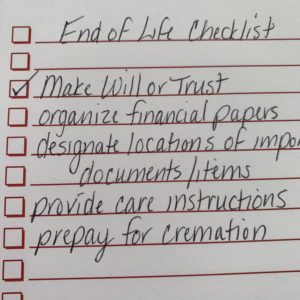
Spend the energy, effort, and time now to consider your wishes, collect information and, most importantly, get everything down on paper.
A list of all your assets and critical personal information is a guarantee that nothing is forgotten, missed, or lost. An estate planning attorney can assist you and guide you through the process.
Admittedly, it’s an unpleasant subject and a topic most people don’t want to discuss, but an end-of-life checklist can be a welcome final gift to your family and loved ones.
When you work with an experienced estate planning attorney, you can generally add some specific instructions to your Will or other estate planning documentation. Make certain that you appoint an executor/personal representative that you trust and will carry out your wishes.
Have ready for your attorney all of your vital, personal information. This should include your name, birthdate, and Social Security number, as well as the location of key documents and items, such as birth certificate, marriage license, military discharge paperwork (if applicable), and your Will, powers of attorney, medical directives, ID cards, medical insurance cards, and details about your burial plot.
In addition, you need to let your family know about the sources of your income. This type of information should include specifics about pensions, retirement accounts, 401(k), or your 403(b) plan. Be sure to include the company name and contact information, as well as the account number, date of payment, document location, and when/how received.
Your end-of-life checklist should also include all medicines and medical equipment used, and the location of these items.
And then double check the locations of the following items: bank documents, titles and deeds, credit cards, tax returns, trust and power of attorney, mortgage and loan documents, personal documents, and insurance policies – life, health, auto, home, etc. It’s wise to add account numbers and contact information.
You may also want to consider creating a list of online usernames and passwords, in printed form, for your family or loved ones to use to access and monitor accounts. Or, better yet, use a password manager app such as LastPass, DataVault, 1Password, etc., to store all your usernames and passwords. Then you just need to let your family know your one master password to access that app.
Be sure to keep your End-of-Life Checklist in a secure place, such as an in-home safe, because it has sensitive and private information. And don’t forget to tell your executor/personal representative where it’s located.
Other articles you may find interesting:
Have an IRA? The CARES Act of 2020 Impacts You
Naming a Child as Successor Trustee?








